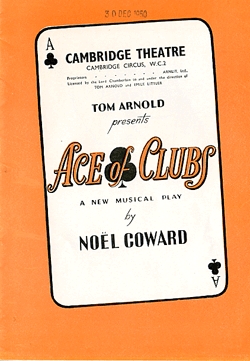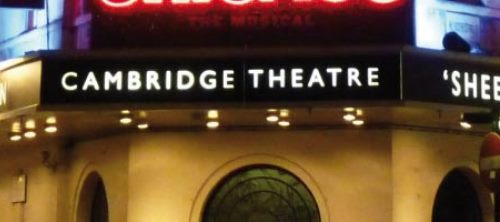
Cambridge Theatre
Londres - Angleterre
Construction: 1930
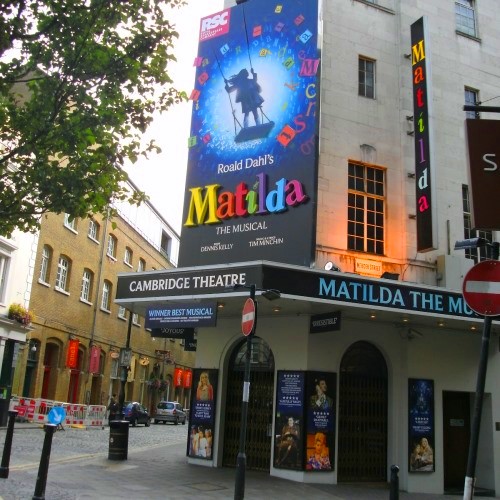
Topologie du théâtre
Nombre de salles actives: 1
Salle 1: (1231) 1930 - Actif
Accès
En métro: Covent Garden/Leicester Square
En bus: 14, 19, 24, 29, 38, 176
Adresse: 32-34 Earlham Street, London, WC2 9HU
Evolution
Bâtiment: The Cambridge Theatre was built in 1929-30. It was designed by Wimperis, Simpson and Guthrie; interior partly by Serge Chermayeff, with interior bronze friezes by sculptor Anthony Gibbons Grinling. The theatre is built in steel and concrete and is notable for its elegant and clean lines of design. The theatre was refurbished in 1950—the original gold and silver décor was painted over in red, and candelabras and chandeliers were added. In 1987, in order to restore the original décor, the theatre was once again refurbished, this time by Carl Toms.
Nom:
Propriétaire(s)
Really Usefull Group
Remarquable
Interior designed in moderne expressionist style - Three panels of exercising and dancing nude figures in foyer - Elliptical interior shell-concrete ceiling - Brass-faced zig-zag etched interior doors - Interior decoration of triangular patterning

1231
1930 - Actif
Opened in 1930, the Cambridge Theatre occupies the angle between Earlham Street and Mercer Street (formerly Great Earl Street and Little White Lion Street), one of the junctions that make up Seven Dials. Dominated by a central Doric column carrying six sundials, the pillar acting as the seventh, this is now a neat, clean, paved circus on the western edge of a revitalized Covent Garden. The present facsimile column, with its surrounding mixture of 18th- and 19th-century domestic and warehouse buildings, was unveiled by Queen Beatrix of the Netherlands on 29 June 1989, putting a stamp of approval on an area formerly notorious as a focus of the London underworld.
The land around Seven Dials was first developed in the 1690s, and so notorious did it become as a haunt of gangs and criminals that their gathering point, the original column, was removed in 1773. Over the ensuing 200 years little improved, and in the 19th century Monmouth Street, running north-south through the circus, was famous only for its unsavoury second- and third-hand clothes market. The area began to emerge from the murk when Charing Cross Road and Shaftesbury Avenue were created In the 1880s, and by the 1920s It wai part of the working area of Covent Garden, centred on the market: not upmarket, but not slummy either.
The late 1920s and 1930s saw something of an explosion in theatre building in the West End, with, among others, the Adelphi, the Phoenix, the Fortune, the Piccadilly and the Carlton Haymarket opening their doors to the public for the first time. It is difficult to know exactly why the entrepreneur and speculator Bertie Meyer chose such an inconvenient triangular site on which to build a theatre; as so often, the question of price springs to mind as a possible reason. The five-storey Portland-stone exterior of the Cambridge, with its chamfered entrance angle on to the circus, and long flank elevations relieved by mostly small windows, cannot be said to be exciting, but the interior has been touched by the hand of a master.
The building having been designed for Meyer by the successful practice of Wimperis, Simpson and Guthrie - a firm geared more to housing and office, rather than theatre, design - it was perhaps considered prudent to import a specialist to work on the interior. That specialist was a man of genius: Serge Ivan Chermayeff, a Russian who had come to England at the age of 10 and worked as director of the modern furnishings department at Waring & Gillow department store before establishing his own architectural practice in 1930. Later he was to design, with Erich Mendelsohn, what is probably the premier building of the modern movement in Britain: the De La Warr Pavilion at Bexhlll-on-Sea, Sussex. In 1940 he emigrated to America. It Is not known precisely how Meyer made the happy choice of his Interior designer - the Cambridge was virtually Chermayeff’s first commission In private practice - but the budding designer had doubtless made as many contacts as possible from his position at Waring & Gillow, and may already have been acquainted with Wlmperis.
The foyer is graced by three panels of posed dancing and exercising nude figures, and the walls, once partly of marble, are now painted deep apricot, under a multilayered ceiling accommo¬dating concealed lighting. A barrel-vaulted corridor sweeps round the back of the fan-shaped auditorium - which was originally painted pink, silver and blue and is now decorated in white and gold. Chermayeff brought Into this theatre a clean-cut style, perhaps more familiar in Germany, which looked forward to the cinema architecture of the later 1930s. The elliptical shell-concrete ceiling Is arranged in wide bands to provide a sophisticated scheme of concealed lighting, and the auditorium decoration is confined, for the most part, to moderne triangular patterning. Above the boxes are panels, one showing modern, gaunt buildings against a stylized sun, the other, the last rays of the setting sun with waves.
The theatre opened with Chariot's Masquerade, starring Beatrice Lillie, and established a pattern of musicals alternating with ballet and opera. Half a Sixpence with Tommy Steele was a huge success In the early 1960s, as was Behind The Fridge with Peter Cook and Dudley Moore in 1972.
The Cambridge Theatre was built in 1929-30. It was designed by Wimperis, Simpson and Guthrie; interior partly by Serge Chermayeff, with interior bronze friezes by sculptor Anthony Gibbons Grinling. The theatre is built in steel and concrete and is notable for its elegant and clean lines of design. The theatre was refurbished in 1950—the original gold and silver décor was painted over in red, and candelabras and chandeliers were added. In 1987, in order to restore the original décor, the theatre was once again refurbished, this time by Carl Toms.
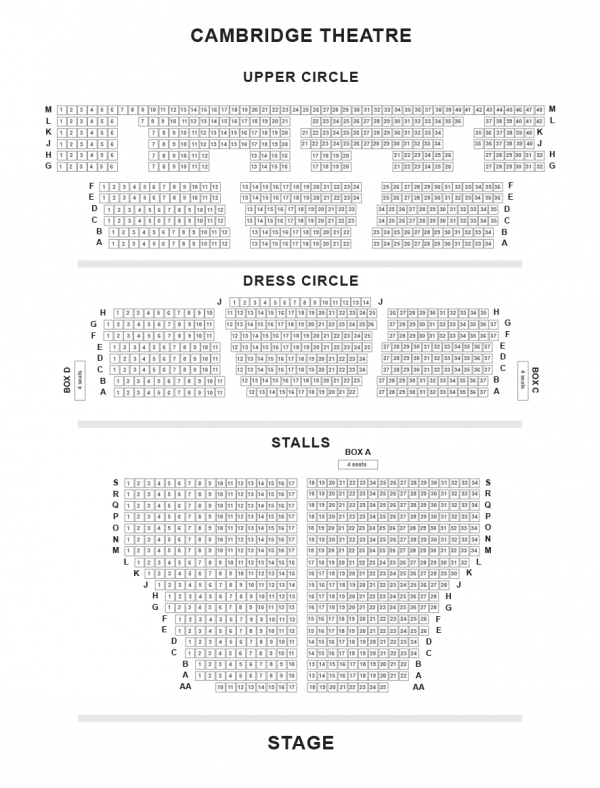
Infos complémentaires:
The Stalls are moderately deep and are divided by a centre aisle that runs the full length of the auditorium. The section gets progressively wider, with 34 seats per row at the back section. The Circle overhang occurs far back in the section and does not restrict the view for the audience, even towards the rear. The section is well raked, allowing good sight lines from all levels.
The stalls are slightly curved at the end, meaning the ends of the rows have slightly restricted views although this is not reflected in the price structure. Sitting on the end of end of each row is not necessarily a bad deal, as due to the current staging and set design, the seats end up coming within the proscenium. They are not necessarily to be avoided but pick more central seats first. Leg room in this section is better than average, and the seats are comfortable. Booster seats are available for the current production and are available free of charge. Please ask an usher on arrival who will be happy to help.
The Dress Circle is divided into three equal sections, making a central section and a house right and house left. The section is raked so visibility is good throughout the whole section, and it doesn't feel too high. Unlike other theatres the Dress Circle at the Cambridge is built in a block and does not curve, meaning even seats on the ends of rows are not restricted and give an excellent overall view of the action.
There is a small metal safety rail running along the front of row A, but this is discrete and does not cause too many problems. Those with children however may prefer to sit a few rows back from the front so it remains entirely out of view. As most of this section is priced the same, it is worth asking for more central seats first.
The Upper Circle is significantly larger than the Dress Circle as it is divided into an upper and a lower section by a dividing wall. The front section provides the best views of the stage, only by being closer to the action, and is divided into three sections like the Dress Circle. The back section of the Upper Circle features some more restricted seats, due to the unusual shape around the gangways and stairwells. It would be advised to avoid these seats initially, although they are the cheapest in the auditorium so would suit those on a budget. Safety rails run along the front of the section, as well as around the stairwells which may cause problems to shorter audience members.
Due to the grandeur of the building the Upper Circle can feel quite disconnected to the stage, as the Proscenium is framed by lighting rigs as well as the curved roof. Sight lines are rarely obstructed, but for those wishing to feel a little more connected to the performance may wish to sit in the front section or in the lower levels. Leg room is good on this level, and the overall comfort of the theatre rates highly throughout the West End.
Interior designed in moderne expressionist style - Three panels of exercising and dancing nude figures in foyer - Elliptical interior shell-concrete ceiling - Brass-faced zig-zag etched interior doors - Interior decoration of triangular patterning
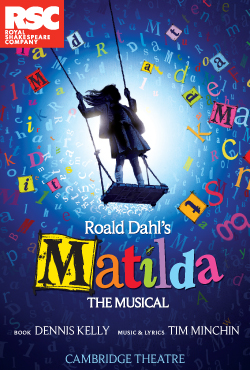
Musical
Original London
1) Matilda The Musical (Original London)
Joué durant 9 ans 4 semaines
Première preview: mar. 25 octobre 2011
Première: jeu. 24 novembre 2011
Dernière: Open end
Compositeur: Tim Minchin •
Parolier: Tim Minchin •
Libettiste: Dennis Kelly •
Metteur en scène: Matthew Warchus •
Chorégraphe: Peter Darling •
Avec: Cleo Demetriou/Kerry Ingram/Sophia Kiely (Matilda), Josie Walker (Mrs Wormwood), Paul Kaye (Mr Wormwood), Gary Watson (Rudolpho), Bertie Carvel (Miss Trunchbull), Lauren Ward (Miss Honey), Peter Howe, Melanie La Barrie, Matthew Malthouse, Emily Shaw, Verity Bentham, Alistair Parker.
Commentaire: Based on the novel by Roald Dahl, the musical opened at the Courtyard Theatre in Stratford-upon-Avon on December 9th 2010 (previews from November 9th) and ran until the end of January. The production was re-staged in the West End on November 24th (previews from October 25th) with all the principal cast returning from the Stratford cast, plus three separate teams of nine children, “Matilda” opened to widespread critical acclaim, fast becoming one of the most successful British musicals in modem history. The show won seven Olivier Awards including Best New Musical, at the 2012 ceremony - the most awards ever won by a single show. Cast replacements in April 2012 included Steve Furst (Mr Wormwood) and Hayley Flaherty (Miss Honey) and later replacements planned for the summer were announced as David Leonard (Miss Trunchbull) and Annette McLaughlin (Mrs Wormwood). It was also announced that a Broadway production is scheduled to open in March 2013. (plus)
Presse: Utterly exhilarating – Matilda explodes onto the stage’ (The Independant)
‘Gleefully nasty. An evening of unadulterated bliss’ (The Guardian)
‘Hilarious, moving and magical – a glorious production’ (Daily Telegraph)
‘The quest for a great new musical is over’ (Evening Standard)
‘Smart, quirky and sublimely good fun – I can’t wait to see it again’ (Time Out)
‘An absolute cracker, bursting with dynamism, fizzing with verve – fantastic.’ (Daily Express)
‘Giddily enjoyable – roars of approval shake the theatre.’ (Sunday Express)
Plus d'infos sur cette production:
Plus d'infos sur ce musical

Musical
Original
28) Fermeture COVID (Original)
Joué durant 1 an 4 mois
Première preview: 16 March 2020
Première: 16 March 2020
Dernière: 19 July 2021
Compositeur:
Parolier:
Libettiste:
Metteur en scène:
Chorégraphe:
Avec:
Commentaire: Tous les théâtres anglais ont dû fermer dès le 16 mars 2020 suite à la pandémide de COVID… (plus)
Presse:
Plus d'infos sur cette production:
Plus d'infos sur ce musical
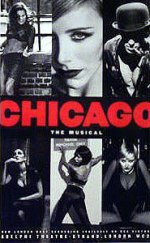
Musical
Revival
27) Chicago (Revival)
Joué durant 5 ans 4 mois
Première preview: 28 April 2006
Première: 28 April 2006
Dernière: 27 August 2011
Fait partie de: London Run
Compositeur: John Kander •
Parolier: Fred Ebb •
Libettiste: Fred Ebb •
Metteur en scène: Walter Bobbie •
Chorégraphe: Ann Reinking •
Avec:
Commentaire: Prolonge la série à l'Adelphi Theatre du 18 Nov 1997 au 22 April 2006 avant un nouveau transfert au Garrick. (plus)
Presse:
Plus d'infos sur cette production:
Plus d'infos sur ce musical
Parolier: Fred Ebb •
Libettiste: Fred Ebb •
Metteur en scène: Walter Bobbie •
Chorégraphe: Ann Reinking •
Avec:
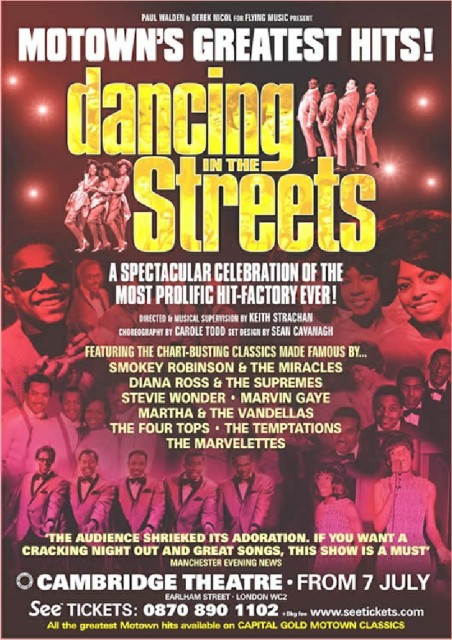
Musical
Original
26) Dancing in the streets (Original)
Joué durant 9 mois 1 semaine
Première preview: 08 July 2005
Première: 19 July 2005
Dernière: 22 April 2006
Compositeur: *** Divers •
Parolier: *** Divers •
Libettiste: *** Divers •
Metteur en scène: Keith Strachan •
Chorégraphe: Carole Todd •
Avec:
Commentaire: Opened Cambridge Theatre 8 July 2005, transferred to Aldwych 27 April 2006, transferred to Playhouse 1 Aug 2006 (plus)
Presse:
Plus d'infos sur cette production:
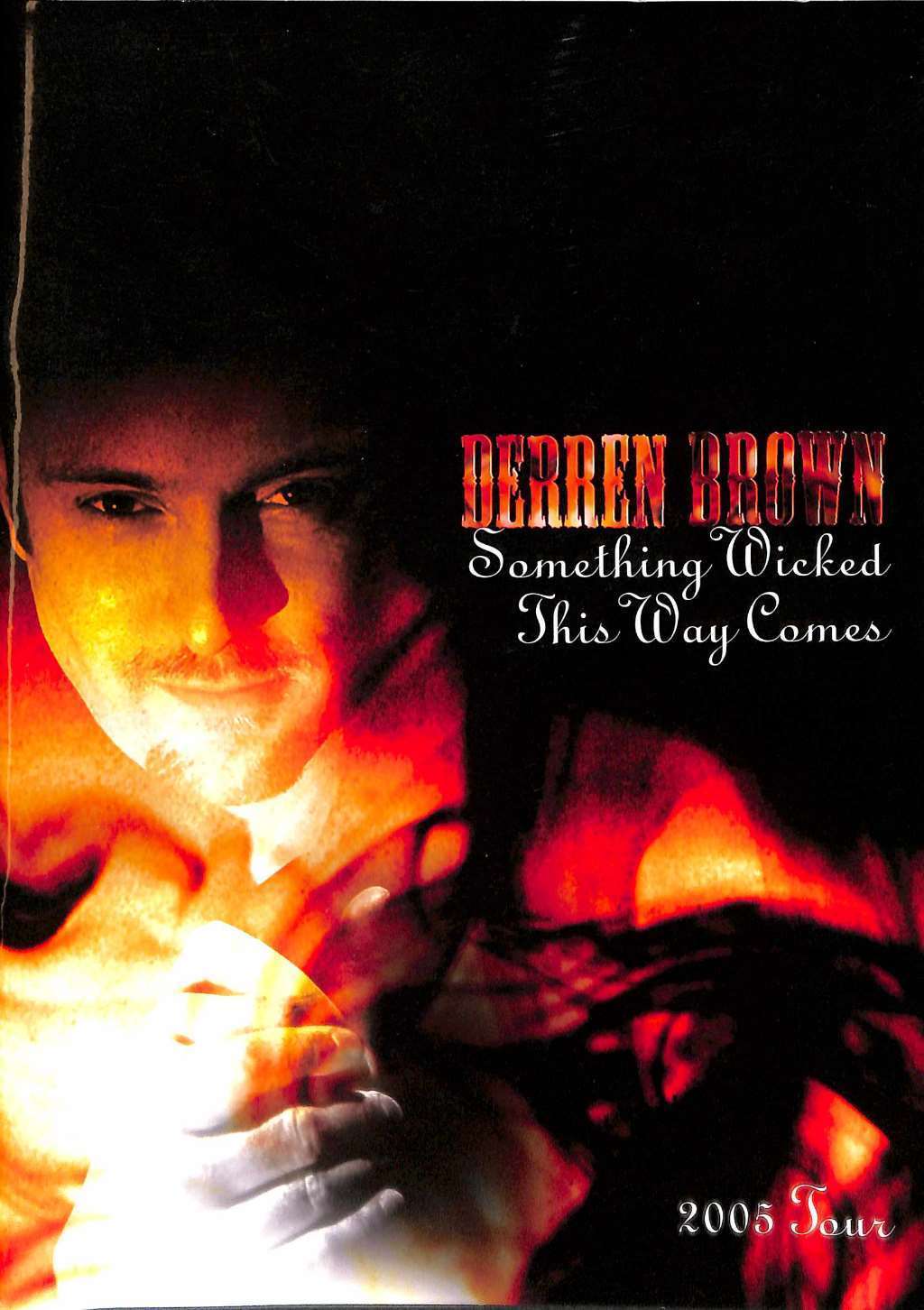
Spectacle
UK Tour
25) Something Wicked This Way Comes (UK Tour)
Joué durant 2 semaines
Première preview: 31 May 2005
Première: 31 May 2005
Dernière: 18 June 2005
Compositeur: *** Divers •
Parolier: *** Divers •
Libettiste: *** Divers •
Metteur en scène:
Chorégraphe:
Avec: Derren Brown
Commentaire:
Presse:
Plus d'infos sur cette production:
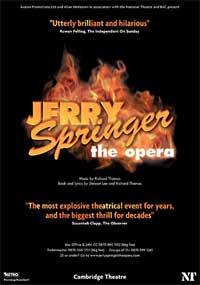
Musical
West End Transfer
24) Jerry Springer: The Opera (West End Transfer)
Joué durant 1 an 3 mois 1 semaine
Première preview: 14 October 2003
Première: 10 November 2003
Dernière: 19 February 2005
Compositeur: Richard Thomas • Stewart Lee •
Parolier: Richard Thomas • Stewart Lee •
Libettiste:
Metteur en scène: Stewart Lee •
Chorégraphe: Jenny Arnold •
Avec: David Soul (Jerry Springer), Guy Porritt (Steve), David Bedella (Warm-Up Man / Satan), Benjamin Lake (Dwight / God), Carrie Ellis (Peaches / Baby Jane), Claire Platt (Zandra / Irene / Mary), Ryan Molloy (Tremont / Angel Gabriel), Leon Craig (Montel / Jesus), Annabelle Williams (Andrea / Archangel Michael), Alison Jiear (Shawntel / Eve), Christopher Key (Chucky / Adam), Edward Baruwa (Dwayne Wayne), Dale Branston (Carlo Collins), Leroy Charlery (Bouncer, Ziggy Washington), Jason Griffiths (Michael Melikidse), Kiara Jay (Courtney Taylor), Trevor Jary (Drea Curtis), Nicole Joy-Fraser (Ariana Kostopoulos), Ruby King (Mercedes Serenity Jones), Kirsty Malpass (Tamera James), Elen Mon Wayne (Samantha Brown), Aoife Nally (Val Rosenthal), David O'Dell (Gilbert Nixon White), Johan Pearson (Bouncer, Tony Johnson), Andrew Playfoot (Marlon Jackson III), Verity Quade (Laurie Rae Johnson), Jeremy Secomb (Waylon Wasowski), Phillip Sutton (Elder F. Lower), Stephanie Tavernier (Teresa Jackson), Phong Truong (Elvis Chang), Elin Wyn Lewis (Tania Lee), Adriano Agostino (Earnest Diggle), Richard Alliston (Brett Monroe), John Coates (Dustin Summers), Jenny Dale (Betsy-Lou Danvers), Tania Mathurin (Letitia Moesha Jackson), Scott Monello (Bobby Jetson), Nicola Rutherford (Lorie Tyler), Gayle Telfer Stevens (Stella Eleanor Jefferson), Karen O Novak (Jerrycam Sequence Dancer)
Commentaire: This was Nicholas Hytner’s first show as the new artistic director of the Royal National Theatre, and it seemed to herald a new era, very different from Trevor Nunn’s series of American musicals’ “golden oldies”.
It had been rewritten and enlarged from earlier “fringe” versions at the Edinburgh Festival and the BAC, and proved to be hugely controversial. The clash of high operatic music and big choral parodies with scatological lyrics about whores, crack, and junkies made some critics compare it to a modern day “Beggar’s Opera”. A nearly naked Jesus admitting to being “a bit gay”, a plump glam-rock God descending on a golden swing singing “It Ain’t Easy Being Me”, and Jesus and Satan performing a baroque duet caused some critics to scream blasphemy. Adam and Eve and the Holy Virgin appearing as guest artists on the Jerry Springer TV chat-show made some critics respond enthusiastically to the satire on the cheap values of modern society. The show won four Olivier Awards including Best Musical. (plus)
Presse:
Plus d'infos sur cette production:
Plus d'infos sur ce musical
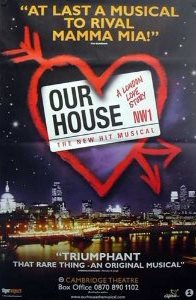
Musical
Original
23) Our House (Original)
Joué durant 9 mois 3 semaines
Nb de représentations: 331 représentations
Première preview: 07 October 2002
Première: 28 October 2002
Dernière: 16 August 2003
Compositeur: Madness •
Parolier: Madness •
Libettiste: Tim Firth •
Metteur en scène: Matthew Warchus •
Chorégraphe: Peter Darling •
Avec: Michael Jibson (Joe Casey), Julia Gay (Sarah), Lesley Nicol (Joe ’s Mum), Ian Reddington (Joe’s Dad), Richard Frame, Oliver Jackson, Tameka Empson, Andrea Francis, Matt Cross, Mike Scott, James Beattie, Mark Hilton, Paul Kemble
Commentaire: On the surface this was another compilation “greatest hits” show of the “We Will Rock You” kind. However, the numbers were wrapped around a skilful narrative with inventive and cheerful choreography and a much praised central performance from Michael Jibson as Joe. Although the show received mostly enthusiastic notices, business was very patchy: a series of matinees were cancelled, then matinee days were re-arranged until unexpectedly the show won the 2003 Olivier Award for Best Musical of the Year. This gave it a boost, and it continued to run until mid-August, 2003 - a ten month run. (plus)
Presse: MICHAEL COVENEY for THE DAILY MAIL says, "There is something fresh and original here......incisive and imaginative production."
IAN JOHNS for THE TIMES says, "Our House comes as a welcome relief from the camp idolatry behind Mamma Mia! and We Will Rock You."
MICHAEL BILLINGTON for THE GUARDIAN did not like it much saying, "In the course of a long evening, the law of diminishing returns inevitably applies" And going on to say, "The musical groans under the burden of too much plot; and after a time the raucous sameness of the numbers begins to pall. "
NEIL SMITH for BBC ONLINE says, "Matthew Warchus's direction is slick and inventive, while the young cast are clearly having the time of their lives."
CHARLES SPENCER for THE DAILY TELEGRAPH gives a luke-warm notice saying, "Somehow the show adds up to less than the sum of its promising parts." And goes on to say, "Even fanatical admirers of Madness are likely to find themselves exhausted rather than elated."
NICHOLAS DE JONGH for THE EVENING STANDARD says, "A compelling, knife-sharp affair." He goes on to say, "Our House is that rare thing, an original musical."
PETER HEPPLE for THE STAGE, "Even though the group's songs are all similar in style, Tim Firth has done a good job concocting a plot around them. "
Plus d'infos sur cette production:
Plus d'infos sur ce musical
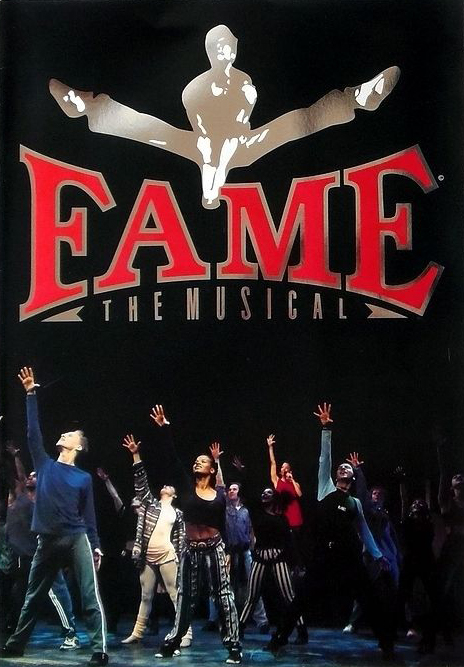
Musical
Revival
22) Fame (Revival)
Joué durant 11 mois 2 semaines
Première preview: 20 September 2001
Première: 20 September 2001
Dernière: 31 August 2002
Fait partie de: London Run
Compositeur: Steve Margoshes •
Parolier: Jacques Levy •
Libettiste: Jose Fernandez •
Metteur en scène: Karen Bruce • Runar Borge •
Chorégraphe: Lars Bethke •
Avec:
Commentaire: Transféré du Victoria Palace Theatre et sera transféré à l'Aldwych Theatre (plus)
Presse:
Plus d'infos sur cette production:
Plus d'infos sur ce musical
Parolier: Jacques Levy •
Libettiste: Jose Fernandez •
Metteur en scène: Karen Bruce • Runar Borge •
Chorégraphe: Lars Bethke •
Avec:
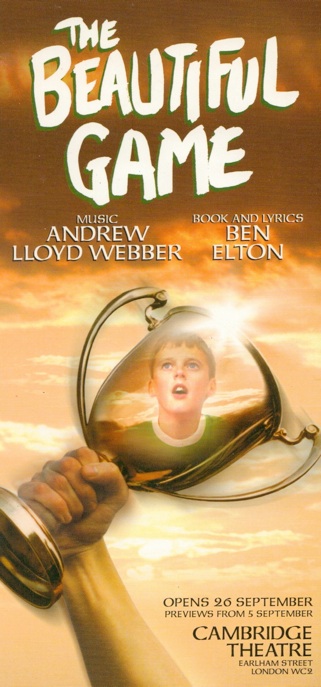
Musical
Original
21) Beautiful Game (The) (Original)
Joué durant 11 mois 1 semaine
Nb de représentations: 391 représentations
Première preview: 05 September 2000
Première: 26 September 2000
Dernière: 01 September 2001
Compositeur: Andrew Lloyd Webber •
Parolier: Ben Elton •
Libettiste: Andrew Lloyd Webber • Ben Elton •
Metteur en scène: Robert Carsen •
Chorégraphe: Meryl Tankard •
Avec: Frank Grimes (Father O ’Donnell), Ben Goddard (Del), Hannah Waddingham (Christine), Michael Shaeffer (Thomas), David Shannon (John), Josie Walker (Mary), Dale Meeks (Greg), Jamie Golding, Alex Sharpe, Diane Pilkington, Nic Greenshields, David Lyons
Commentaire: This show truly divided the critics. Some claimed it was a powerful, dark, intelligent musical, containing some of Lloyd Webber’s most sophisticated and deeply-felt music; others claimed it was a one-sided, patronising Romeo and Juliet rip-off, mis-matching over-romanticised music with an over-done tale of murder, knee-capping and internment camps. The show ran for just under a year, closing on September 1st, 2001. A re-written version was performed in Canada in 2009 with a new title “The Boys in the Photograph” and a happier ending. The song "Our Kind of Love" was replaced with a new song "The Boys in the Photograph" and several other songs were cut. (However, “Our Kind of Love” would be re-worked and appear in Andrew Lloyd Webber’s later musical “Love Never Dies”.) (plus)
Presse: The show has received 'reasonable ' reviews from the popular press. None of the press have been shouting from the roof-tops on how good it is, but then none have rubbished it either…..
BENEDICT NIGHTINGALE for THE TIMES says, "Elton doesn't always seem aware of the line between the simple and the clunky. But Webber not only extends his musical range but comes up with two or three lovely numbers, each packed with his trademark yearning." He goes on to say, "There are no truly exciting performances, but also no weak ones."
NICHOLAS DE JONGH for THE EVENING STANDARD says, "A dramatic, pioneering musical that dares to make a song and dance of the troubles of Northern Ireland." He goes on to say, "Robert Carsen's well-drilled and paced production cannot disguise the fact that Elton's book allows dull romancing to overwhelm a brave, sharp shot at a controversial, politically motivated musical."
SHERIDAN MORLEY for TELETEXT, says, "Lloyd Webber's songs are intricately slotted into the storyline and many of them have a lilting, yearning charm." Morley ends his review with, "What this show suggests is that you no longer have to go to a musical having checked your brains into the cloakroom."
PAUL TAYLER for THE INDEPENDENT says, "The Beautiful Game has its moments, with full-throated, plangent anthems; the impossibly catchy melody of its message-song, "Our Kind of Love"; and the hard-edged, exuberant synthesis, in the kicking twirls and leaps of Meryl Tankard's choreography, of the movements of football and modern ballet." He goes on to say, "The trouble with the show is not the Celtic-tinged music, which is never less than decent, nor the lyrics which, though uninspired, aren't actively blush-making. No, the culprit here is the book."
CHARLES SPENCER for THE DAILY TELEGRAPH says, "Sadly, hopes that The Beautiful Game might prove a Northern Irish West Side Story are hardly realised. Indeed, at worst the piece comes over like Grease-meets-Riverdance with the odd bit of earnest Eltonesque moralising thrown in." However, Spencer goes on to say, "The music includes some of Lloyd Webber's most haunting and memorable ballads."
MICHAEL BILLINGTON for THE GUARDIAN says, "Even if the musical falls at the last hurdle, it as at least trying something boldly different, and Lloyd Webber's score, with its echoes of Irish folk and ballad music, is his best since Aspects of Love."
JOHN PETER for THE SUNDAY TIMES says Andrew Lloyd Webber "romps home with his best work since Cats and his finest piece of musical theatre ever".
Plus d'infos sur cette production:
Plus d'infos sur ce musical
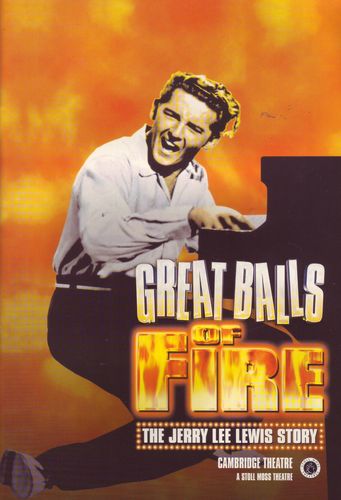
Musical
Original
20) Great Balls of Fire (Original)
Joué durant 2 mois 1 semaine
Nb de représentations: 85 représentations
Première preview: 01 October 1999
Première: 06 October 1999
Dernière: 18 December 1999
Compositeur: *** Divers •
Parolier: *** Divers •
Libettiste: *** Divers •
Metteur en scène: Simon Usher •
Chorégraphe: Tim Flavin •
Avec: Billy Geraghty (Jerry Lee Lewis), Neil Henry (Young Jerry), Heather-Jay Jones (Myra), John Bannister, Kim Bretton, Amelda Brown, Eddie Burton, Stuart Callaghan, Simon Fogg, Liam Grundy
Commentaire: The life-story of Jerry Lee Lewis could have been an amazing evening in the theatre - two bigamous marriages, wife number three being 13 years old, two sons dying in accidents, being arrested outside Graceland brandishing a gun and demanding to see Elvis, shooting his bass player while blasting holes in his office door - but, no! This was a highly sanitised version of his life: Jerry – criticised for jazzing up hymns at Bible college, then the cliché moment when the hostile record producer suddenly realises the hick lad has got talent, skipping very lightly over the marriages, and then the obligatory rock concert with all the well-known Jerry Lee Lewis hits.
However, this show was saved by an amazing performance from Billy Geraghty as the older Jerry, and audiences loved it (though the critics were not so keen). It ran for nine weeks. (plus)
Presse: "The curtain went up so late on the opening night of Great Balls Of Fire that the evening threatened to last longer than some of Jerry Lee Lewis's marriages. But this trawl through the turbulent life of one of rock's early superstars, electrifyingly directed by Simon Usher, was worth waiting for. Todd Ristau and Richard Cameron have written a warts-and-all script charting the progress of the man nicknamed The Killer, from poverty to such hits as the title song and Whole Lotta Shakin' Goin' On and the marriages and mayhem beyond. Billy Geraghty's astonishing performance as Jerry Lee is a potential award-winner. Geraghty sings better than the original, plays the piano with equal flamboyance and flair and acts convincingly to involve a rapt audience in the classic poor-boy-makes-good plot... If you love the golden age of rock, do not miss Great Balls Of Fire. It will set your soul ablaze." The News of the World
"Billy Geraghty sets the piano and stage alight as Jerry Lee Lewis in Great Balls of Fire at the Cambridge Theatre. The flames may be fake but the excitement is real when he hits the ivories as the American rock'n'roller they call The Killer... The musical is more than just another excuse for a '50s pop concert. It traces the rise and fall of the boy from the Bible Belt whose private life was as wild as his piano playing... Geraghty has a real ball. He belts out the hits, and in the spectacular finale he bangs the keyboard with his fists, his backside and his feet until it is not only his blond wig that is all shook up - so is the audience. The Killer knocks 'em dead." The Daily Mirror
"They called him the wild man of rock'n'roll. But, judging by this sanitised bio-show about Jerry Lee Lewis, they might equally well have dubbed him Goody Two Shoes. Ending with his reincarnation as a country singer at the Grand Ole Opry in the late 60s, the show has nothing to say about his last three wives, his inadvertent shooting of his bass player or his arrival outside Graceland with a gun demanding to see Elvis. Written by Todd Wm Ristau and Richard Cameron, the show is largely an excuse to get the songs on as quickly as possible... Happily, Lewis is still alive and working, which may explain the show's mincing caution about his private life. But clearly what the audience has come for is the songs rather than the story and for Billy Geraghty's impersonation of the hero. Looking more like Michael Caine than Jerry Lee Lewis, Geraghty certainly works up a storm pounding the piano with fingers, bum and boot and sending stool and lid crashing into the wings... But for all the verve of Neil McArthur's arrangements, there are long passages of tedium between the numbers and you end up learning little about what made Jerry Lee run. The result is a piece of Tussaud-theatre with decibels on." The Guardian
Plus d'infos sur cette production:
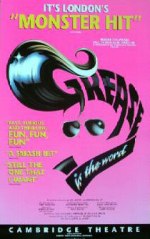
Musical
Revival
19) Grease (Revival)
Joué durant 2 ans 10 mois 3 semaines
Première preview: Inconnu
Première: 24 October 1996
Dernière: 11 September 1999
Fait partie de: London Revival 1993
Compositeur: Jim Jacobs • Warren Casey •
Parolier: Jim Jacobs • Warren Casey •
Libettiste: Jim Jacobs • Warren Casey •
Metteur en scène: David Gilmore •
Chorégraphe: Arlene Phillips •
Avec:
Commentaire: This large-scale, expanded version of the show included the additional songs written for the film. It was an enormous success and received an excellent critical reception, and ran a phenomenal 6 years.
Some of the cast changes during this time included Ian Kelsey, Luke Goss, Sonia, Samantha Janus, Marissa Dunlop, Linzi Hateley. (plus)
Presse:
Plus d'infos sur cette production:
Plus d'infos sur ce musical
Parolier: Jim Jacobs • Warren Casey •
Libettiste: Jim Jacobs • Warren Casey •
Metteur en scène: David Gilmore •
Chorégraphe: Arlene Phillips •
Avec:
Some of the cast changes during this time included Ian Kelsey, Luke Goss, Sonia, Samantha Janus, Marissa Dunlop, Linzi Hateley. (plus)
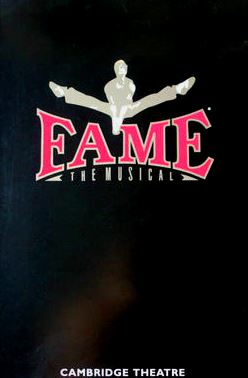
Musical
Original London
18) Fame (Original London)
Joué durant 1 an 3 mois
Nb de représentations: 526 représentations
Première preview: 16 June 1995
Première: 27 June 1995
Dernière: 28 September 1996
Compositeur: Steve Margoshes •
Parolier: Jacques Levy •
Libettiste: Jose Fernandez •
Metteur en scène: Runar Borge •
Chorégraphe: Lars Bethke •
Avec: Scott Sherrin (Tyrone), Sonia Swaby (Mabel), Gemma Wardle (Serena), Richard Dempsey (Nick), Loraine Velez (Carmen), Josefina Gabrielle (Iris), Jonathan Aris, Nicola Bolton, Alastair Willis, Miguel Brown, Vivien Parry, Harry Landis, Bill Champion
Commentaire: Following its original film and spin-off TV series, the critics thought the show was too predictable and cliched - dancer with an eating disorder, student with drug problem, girl in love with boy who might be gay, teacher passionate about Mozart dealing with a class that wants to rap - and was just an excuse for dance numbers and songs not as good as the original soundtrack. It ran for more than a year in London run and then underwent a successful UK tour which was to make a few return visits to the West End over the next years. (plus)
Presse:
Plus d'infos sur cette production:
Plus d'infos sur ce musical
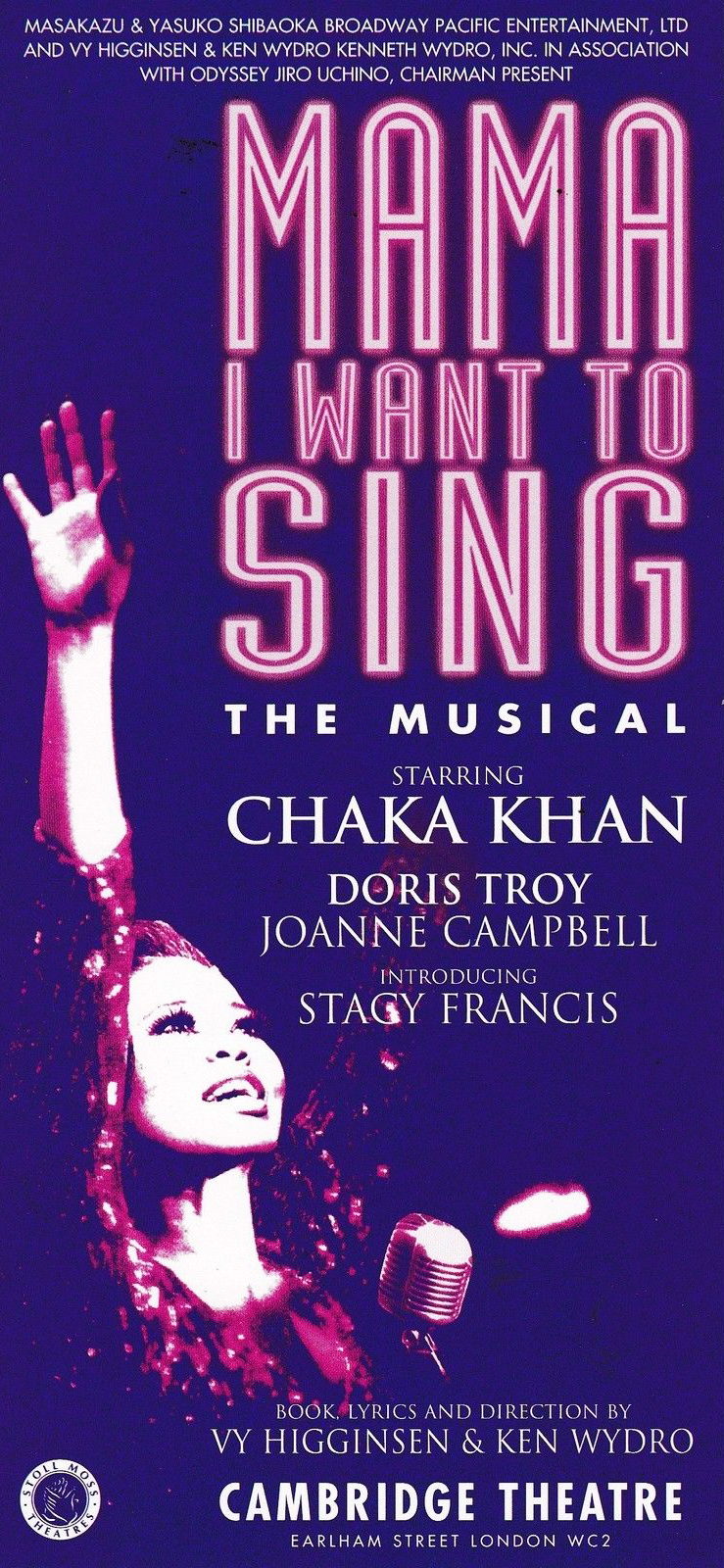
Musical
Original London
17) Mama, I Want to Sing! (Original London)
Joué durant 4 mois 1 semaine
Nb de représentations: 149 représentations
Première preview: 31 January 1995
Première: 01 February 1995
Dernière: 10 June 1995
Fait partie de: London Run
Compositeur: Westly Nailer •
Parolier: Ken Wydro • Vy Higginsen •
Libettiste: Ken Wydro • Vy Higginsen •
Metteur en scène: Vy Higginsen • Ken Wydro •
Chorégraphe: Richard Sampson •
Avec: Doris Troy (Mama Winter), Howard McCrary (Reverend Winter). Stacy Francis (Young Doris), Joanne Campbell (Narrator), Chaka Khan (Sister Carrie), Charles Stewart (Minister of Music)
Commentaire: This show held the record as the longest running all-black off-Broadway show, running for eight years, playing to over 3 million people and taking something like £38 million at the box office in stagings through Europe, Asia and Japan. The part of Doris Troy’s mother was played by Doris Troy herself, and the company included a 15 voice gospel choir. Generally the critics hated it! “Over-amplified, over-long, under-written, uninspired” (Sunday Express), “you end up aching for Motown and wishing the show had been about Diana Ross. Or even Jonathan Ross” (Michael Coveney in “The Observer”.)
Transfered to Gielgud Theatre (plus)
Presse:
Plus d'infos sur cette production:
Plus d'infos sur ce musical
Parolier: Ken Wydro • Vy Higginsen •
Libettiste: Ken Wydro • Vy Higginsen •
Metteur en scène: Vy Higginsen • Ken Wydro •
Chorégraphe: Richard Sampson •
Avec: Doris Troy (Mama Winter), Howard McCrary (Reverend Winter). Stacy Francis (Young Doris), Joanne Campbell (Narrator), Chaka Khan (Sister Carrie), Charles Stewart (Minister of Music)
Transfered to Gielgud Theatre (plus)
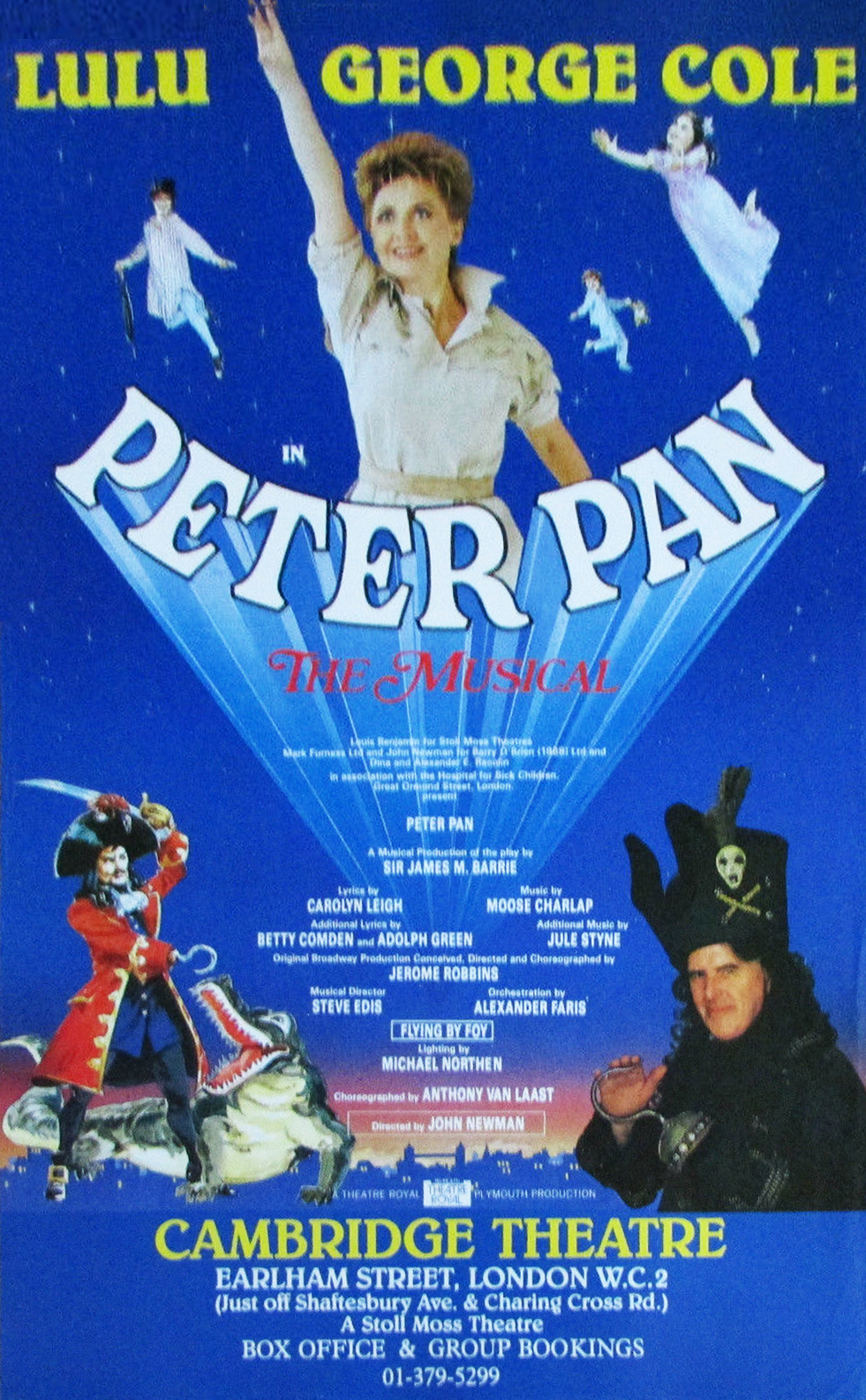
Musical
Original
16) Peter Pan - The British Musical (Original)
Joué durant 1 mois
Première preview: 20 December 1994
Première: 20 December 1994
Dernière: 21 January 1995
Compositeur: *** Divers •
Parolier: *** Divers •
Libettiste: *** Divers •
Metteur en scène: Peer Chater Robinson •
Chorégraphe: George May •
Avec: Ron Moody (Capt. Hook/Mr Darling), Nicola Stapleton (Peter Pan), Debbie Wall (Wendy), Rosemary Williams (Mrs Darling), Pinky Amador (Tiger Lily), Harry Dickman (Smee), David Anthony (Nana)
Commentaire: Apart from the welcome reappearance of Ron Moody in the West End after a long absence, there was hardly anything to recommend this new musical version of J. M. Barrie’s famous story. The Times said: “This dreadful musical hovers, or rather wobbles, between the insufferably twee and the lethally stupid”. The Sunday Telegraph "... There are naff tunes, naffer lyrics, and dowdy sets…" (plus)
Presse:
Plus d'infos sur cette production:
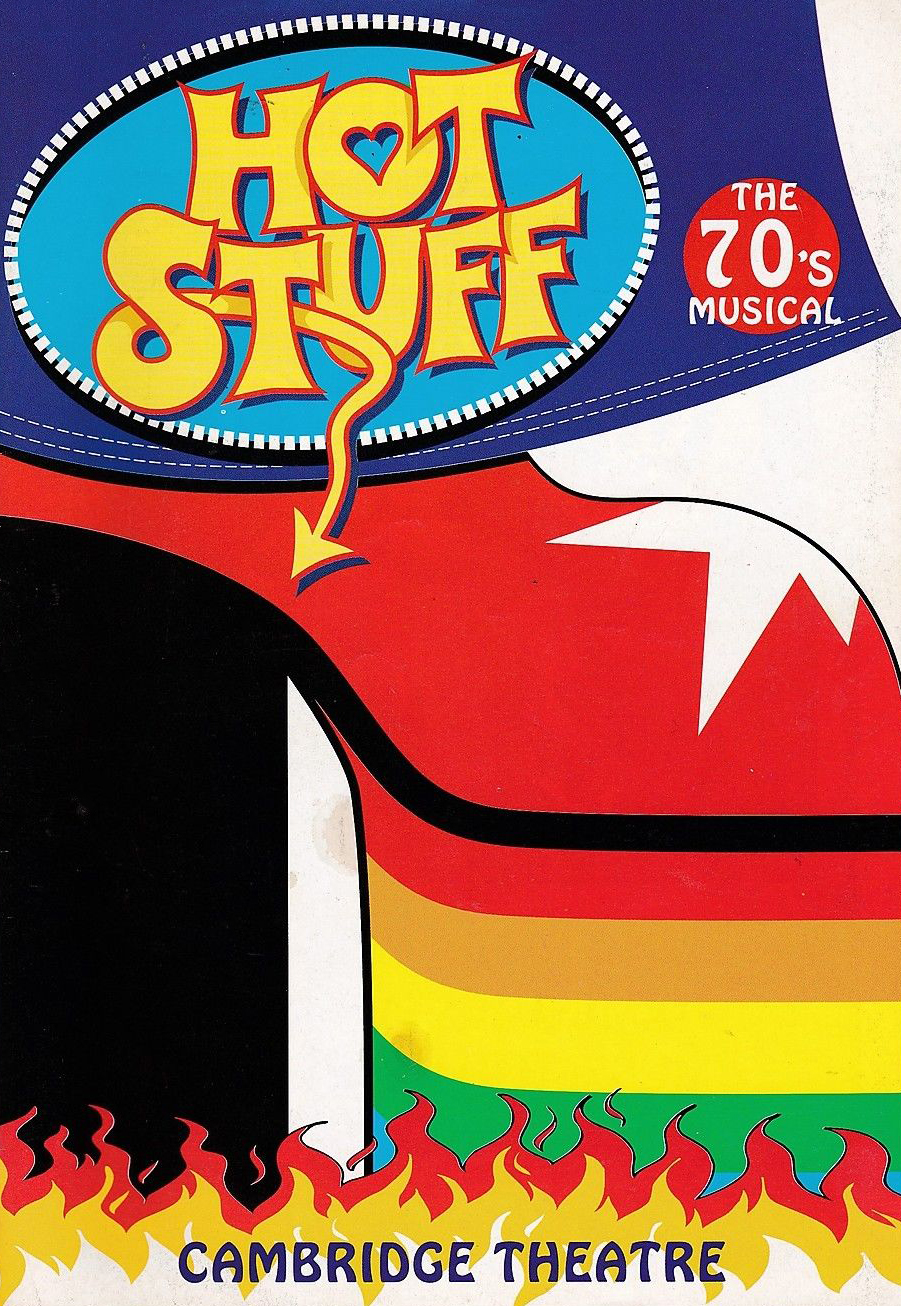
Musical
Original
15) Hot Stuff (Original)
Joué durant
Nb de représentations: 222 représentations
Première preview: Inconnu
Première: 17 August 1993
Dernière: Inconnu
Compositeur: *** Divers •
Parolier: *** Divers •
Libettiste: Maggie Norris • Paul Kerryson •
Metteur en scène: Paul Kerryson •
Chorégraphe:
Avec: Peter Straker (Boss), Guy Oliver-Watts (Joe Soap), Paulette Ivory (Julie), Caroline O’Connor (Mavis de Follies), David Dale (Helen)
Commentaire: According to Sheridan Morley in the Spectator the show consisted of ...a lot of derelict old pop hits sung very loudly by a cast all of whom seem to have had talent and charisma bypasses early in rehearsal... in a production on which every conceivable expense has been spared.
However, other critics felt it had a party atmosphere for those who fancied a disco-type night out. It ran for six months. (plus)
Presse:
Plus d'infos sur cette production:
Plus d'infos sur ce musical
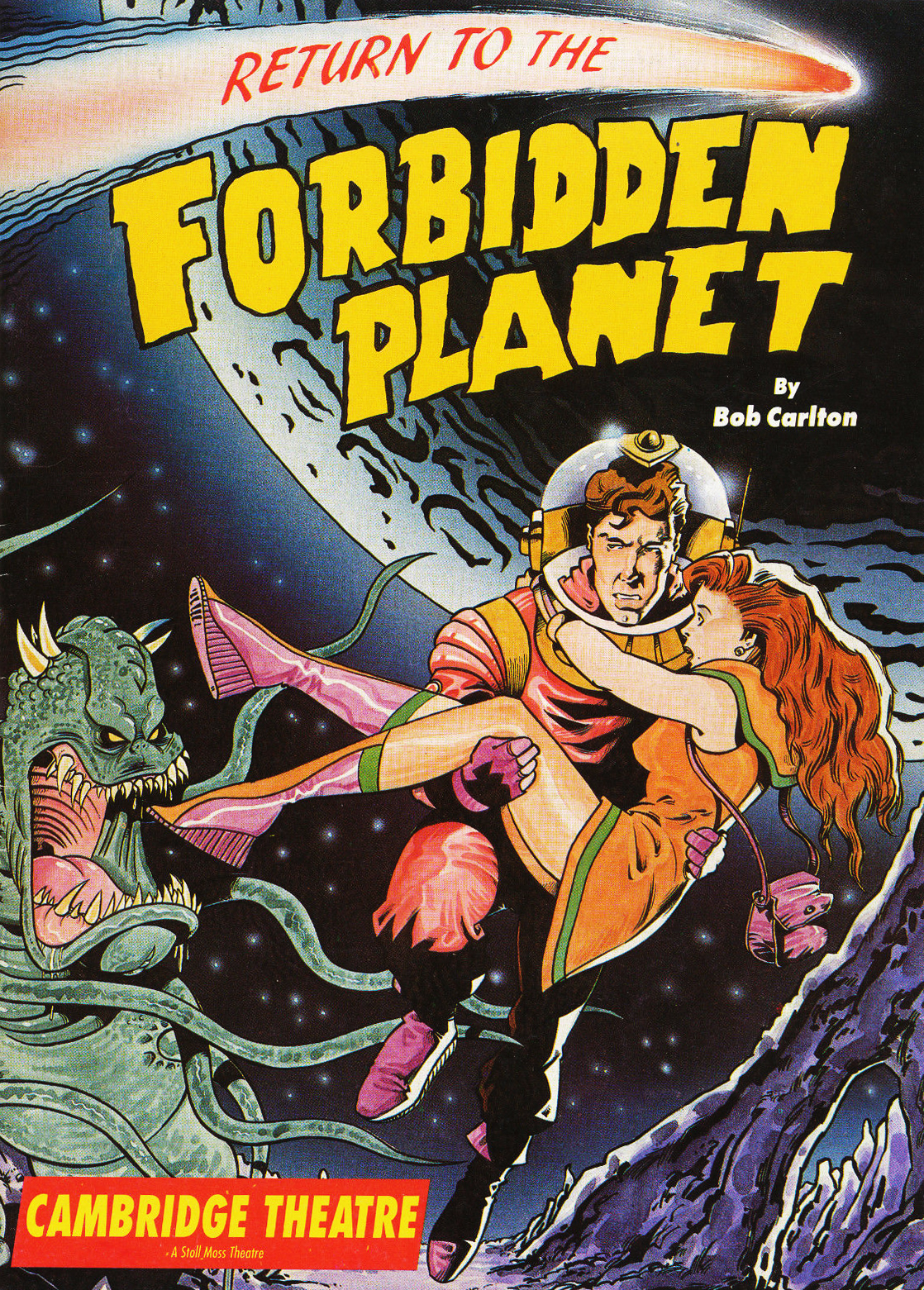
Musical
Original
14) Return to the Forbidden Planet (Original)
Joué durant 3 ans 4 mois
Nb de représentations: 1516 représentations
Première preview: Inconnu
Première: 18 September 1989
Dernière: 16 January 1993
Compositeur: *** Divers •
Parolier: *** Divers •
Libettiste: Bob Carlton •
Metteur en scène: Bob Carlton •
Chorégraphe: Carole Todd •
Avec: John Ashby (Captain Tempest), Christian Roberts (Doctor Prospero), Alison Harding (Miranda), Kraig Thornber (Ariel) , Matthew Devitt, Nicky Furre, Anthony Hunt, Kate Edgar
Commentaire: Based on the B-Movie “Forbidden Planet”, which itself wass derived from Shakespeare’s “Tempest” this show contained some of the best songs from the past 30 years to please the rockers, and enough Shakespeare jokes to please the regular theatregoer, and all-in-all, got a great critical and audience reaction. It was, however, harder to pull in the crowds. Somewhat astonishingly this show won the Olivier Award for Best Musical of the Year, beating “Miss Saigon”, thus causing considerable controversy. (plus)
Presse:
Plus d'infos sur cette production:
Plus d'infos sur ce musical
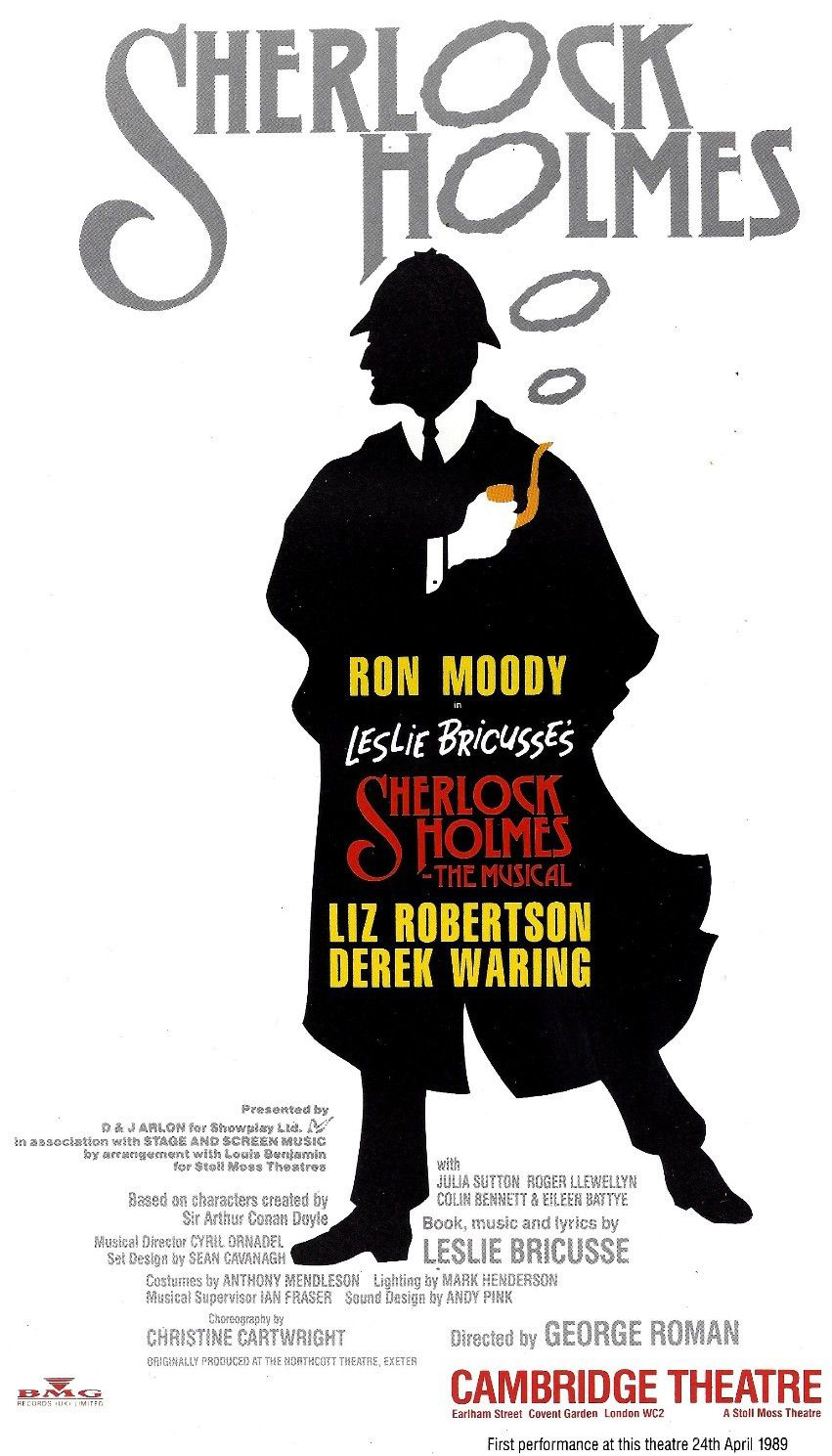
Musical
West End Transfer
13) Sherlock Holmes: The Musical (West End Transfer)
Joué durant 2 mois 2 semaines
Nb de représentations: 97 représentations
Première preview: Inconnu
Première: 24 April 1989
Dernière: 08 July 1989
Compositeur: Leslie Bricusse •
Parolier: Leslie Bricusse •
Libettiste: Leslie Bricusse •
Metteur en scène: George Roman •
Chorégraphe: Christine Cartwright •
Avec: Ron Moody (Sherlock Holmes), Derek Waring {Dr. Watson), Liz Robertson (Bella Moriarty), Julia Nelson (Mrs Hudson), Roger Llewellyn {Inspector Lestrade), Eileen Battye (Mrs Moriarty) John Gower
Commentaire: Originally produced at the Northcott Theatre, Exeter, this was not a success (plus)
Presse:
Plus d'infos sur cette production:
Plus d'infos sur ce musical
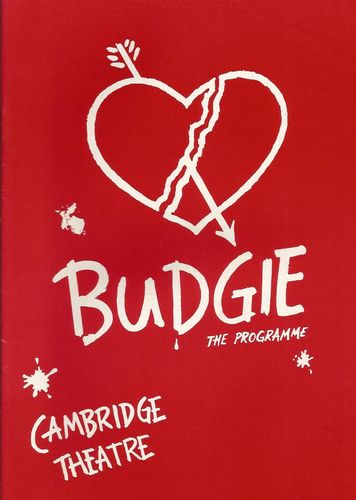
Musical
Original
12) Budgie (Original)
Joué durant 3 mois
Nb de représentations: 110 représentations
Première preview: Inconnu
Première: 18 October 1988
Dernière: 21 January 1989
Compositeur: *** Divers •
Parolier: *** Divers •
Libettiste: *** Divers •
Metteur en scène: Jonathan Lynn •
Chorégraphe: Anthony Van Laast •
Avec: Adam Faith (Budgie Bird), Anita Dobson (Hazel), John Turner (Charlie Endell), Caroline O’Connell (Lulu), Catherine Terry (Helga), Gareth Marks, Julian Littman, Alexandra Worrall
Commentaire: The attempts to turn these unsavoury characters into warm-hearted, loveable Soho folk, even included the winos sleeping in the gutters suddenly joining in a jolly knees-up type chorus. This was Adam Faith’s musical theatre debut, and a number of people asked “What’s a nice guy like you doing in a show like this?” (plus)
Presse:
Plus d'infos sur cette production:
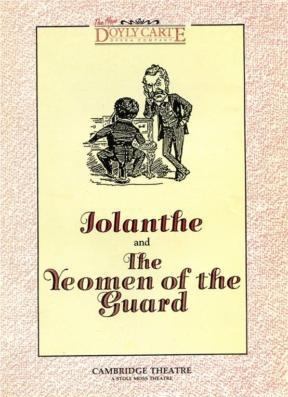
Musical
Revival
11) Yeomen of the Guard (Revival)
Joué durant 1 mois 3 semaines
Première preview: Inconnu
Première: 18 July 1988
Dernière: 10 September 1988
Compositeur: Arthur Sullivan •
Parolier: W.S. Gilbert •
Libettiste: W.S. Gilbert •
Metteur en scène: Christopher Renshaw • Peter Walker •
Chorégraphe:
Avec:
Commentaire: The D’Oyly Carte Opera Company had lost its Arts Council funding and disbanded a few years earlier - an event described by many at the time as a great national loss. Following sponsorship from British Midland Airlines and a bequest from the late Bridget D’Oyly Carte, the New D’Oyly Carte Opera Company has been formed. With a 60-strong company and a 33 piece orchestra conducted by Bramwell Tovey, the new company has been managed by Richard Condon and thanks to the generosity of the Stoll Moss organisation has been able to re-launch itself with a season at the Cambridge Theatre. (The extended run of “Kiss Me Kate” at the Savoy meant they could not play their
original home) (plus)
Presse:
Plus d'infos sur cette production:
Plus d'infos sur ce musical
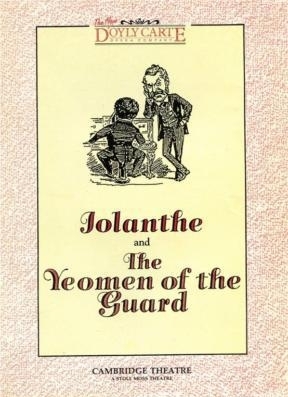
Musical
Revival
10) Iolanthe (Revival)
Joué durant 1 mois 3 semaines
Première preview: Inconnu
Première: 12 July 1988
Dernière: 07 September 1988
Compositeur: Arthur Sullivan •
Parolier: W.S. Gilbert •
Libettiste: W.S. Gilbert •
Metteur en scène: Christopher Renshaw • Peter Walker •
Chorégraphe:
Avec:
Commentaire: The D’Oyly Carte Opera Company had lost its Arts Council funding and disbanded a few years earlier - an event described by many at the time as a great national loss. Following sponsorship from British Midland Airlines and a bequest from the late Bridget D’Oyly Carte, the New D’Oyly Carte Opera Company has been formed. With a 60-strong company and a 33 piece orchestra conducted by Bramwell Tovey, the new company has been managed by Richard Condon and thanks to the generosity of the Stoll Moss organisation has been able to re-launch itself with a season at the Cambridge Theatre. (The extended run of “Kiss Me Kate” at the Savoy meant they could not play their
original home) (plus)
Presse:
Plus d'infos sur cette production:
Plus d'infos sur ce musical
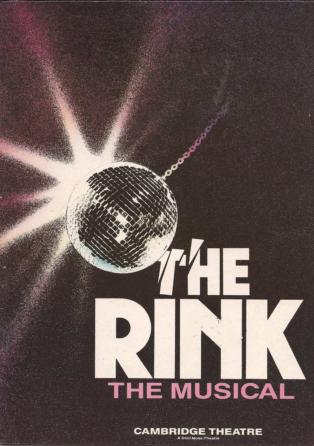
Musical
Original London
9) Rink (The) (Original London)
Joué durant 1 mois
Nb de représentations: 38 représentations
Première preview: Inconnu
Première: 17 February 1988
Dernière: 19 March 1988
Compositeur: John Kander •
Parolier: Fred Ebb •
Libettiste: Terrence McNally •
Metteur en scène: Paul Kerryson •
Chorégraphe: Paul Kerryson •
Avec: Diane Langton {Angel), Josephine Blake (Anna), Lyanne Compton/Sheree Murphy (Little Girl), Michael Gyngell (Lenny), Gareth Snook (Dino), Richard Bodkin, James Gavin, Steve Hervieu, Peter Edbrook
Commentaire: This production originated at the Forum, Wythenshawe. Each member of the all-male gang of wreckers played several parts (including female roles) whilst on roller-skates. The original 1984 Broadway production starred Liza Minnelli and Chita Rivera and ran for 204 performances (plus)
Presse:
Plus d'infos sur cette production:
Plus d'infos sur ce musical
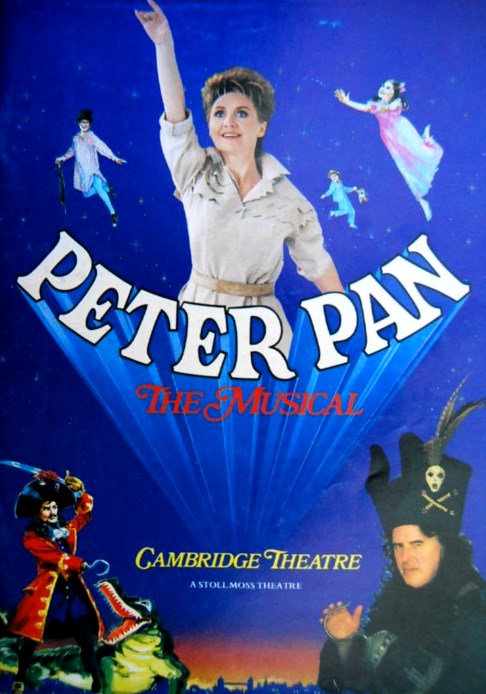
Musical
Revival
8) Peter Pan - The musical (Revival)
Joué durant 2 mois
Première preview: Inconnu
Première: 12 November 1987
Dernière: 16 January 1988
Compositeur: Jule Styne • Moose Charlap •
Parolier: Adolph Green • Betty Comden • Carolyn Leigh •
Libettiste:
Metteur en scène: John Newman •
Chorégraphe: Anthony Van Laast •
Avec: Lulu {Peter Pan), George Cole (Captain Hook), Michelle Thorneycroft (Wendy), Jan Harvey (Mrs Darling)
Commentaire:
Presse:
Plus d'infos sur cette production:
Plus d'infos sur ce musical
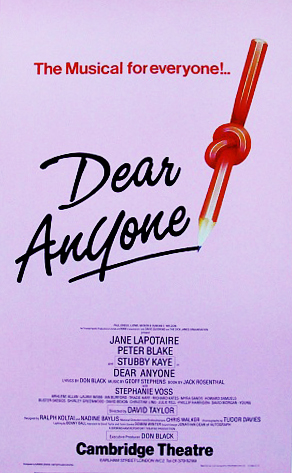
Musical
Original
7) Dear anyone (Original)
Joué durant 2 mois
Nb de représentations: 65 représentations
Première preview: Inconnu
Première: 08 November 1983
Dernière: 07 January 1984
Compositeur: *** Divers •
Parolier: *** Divers •
Libettiste: *** Divers •
Metteur en scène: David Taylor •
Chorégraphe: Tudor Davies •
Avec: Jane Laportaire (Mercedes), Peter Blake (Danny), Stubby Kaye (Harry), Stephanie Voss (Mildred), Ian Burford, Tracie Hart, Richard Kates, Buster Skeggs
Commentaire:
Presse:
Plus d'infos sur cette production:
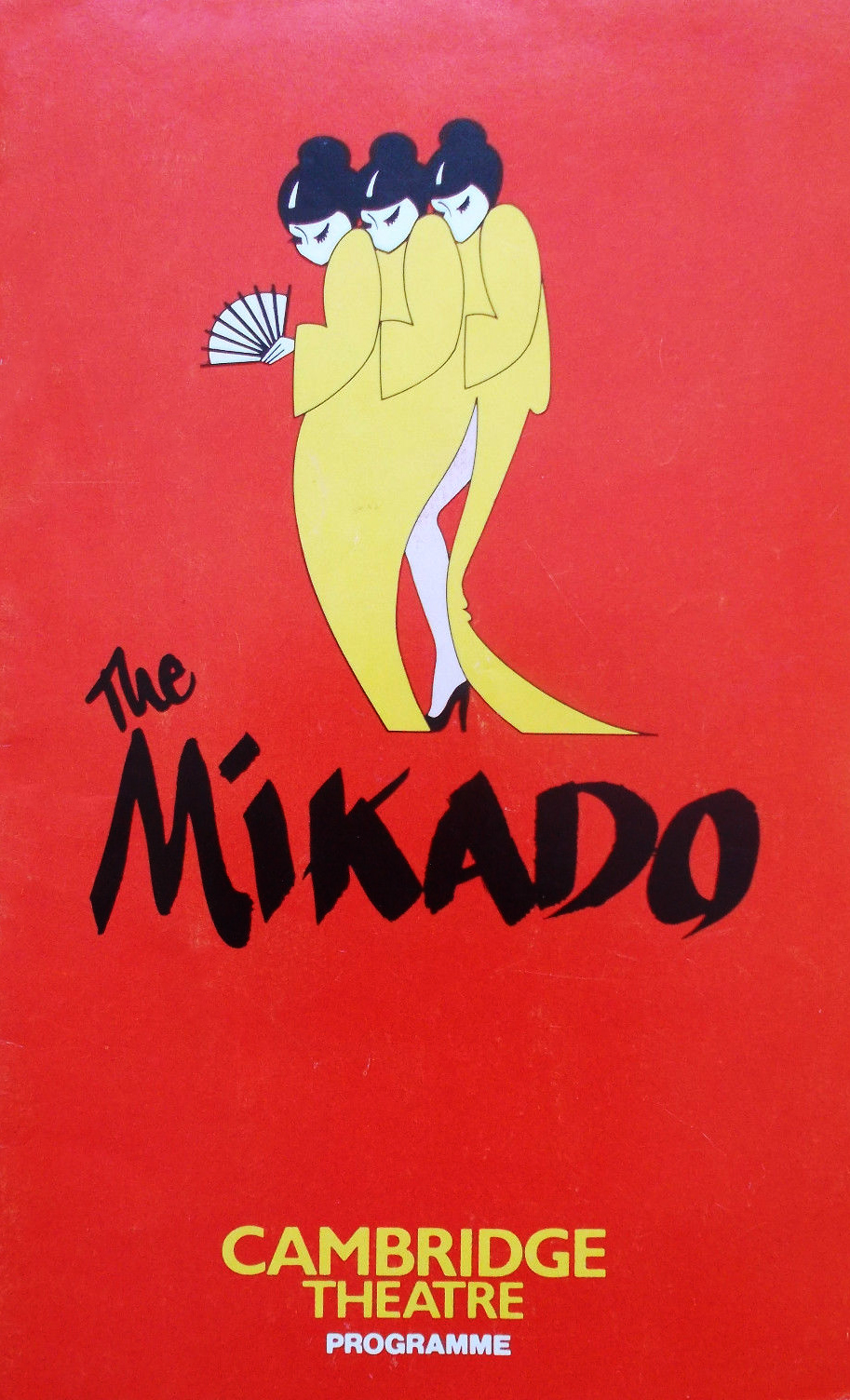
Musical
Original
6) Mikado (The) (Original)
Joué durant 3 mois 1 semaine
Première preview: Inconnu
Première: 28 September 1982
Dernière: 08 January 1983
Compositeur: Arthur Sullivan •
Parolier: W.S. Gilbert •
Libettiste: W.S. Gilbert •
Metteur en scène: Chris Hayes •
Chorégraphe: Michele Hardy •
Avec: Murray Melvin (Ko-Ko), Nicholas Smith (Mikado), Gary Lyons (Nanki Poo), John Hewer (Pooh-Bah), Stella Goodier (Yum Yum), Eileen Gourlay (Katisha)
Commentaire: This was a Theatre Royal Plymouth Production. (plus)
Presse:
Plus d'infos sur cette production:
Plus d'infos sur ce musical
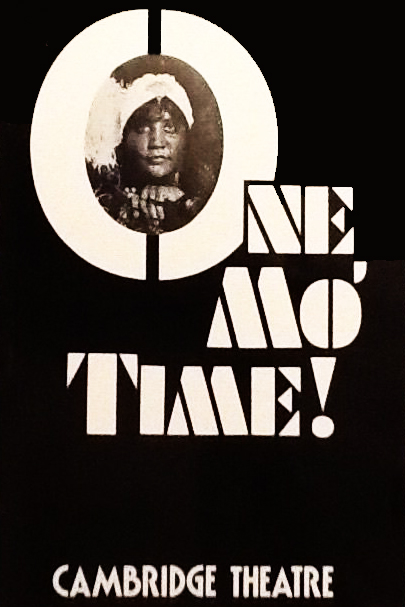
Musical
Original London
5) One Mo' Time (Original London)
Joué durant 4 mois 1 semaine
Première preview: Inconnu
Première: 14 July 1981
Dernière: 21 November 1981
Fait partie de: London Run
Compositeur: *** Divers •
Parolier: *** Divers •
Libettiste: Vernel Bagneris •
Metteur en scène: Vernel Bagneris •
Chorégraphe:
Avec: Sylvia Kuumba Williams (Bertha), Thais Clark (Ma Reed), Topsy Chapman (Thelma),Verne 1; Bagneris (Papa Du), John Stell (Theatre Owner), The New Orleans Blues Serenaders
Commentaire: Cambridge Theatre 14/7/1981 - 21/11/1981
Phoenix Theatre 24/11/1981 - 17/7/1982 (plus)
Presse:
Plus d'infos sur cette production:
Plus d'infos sur ce musical
Parolier: *** Divers •
Libettiste: Vernel Bagneris •
Metteur en scène: Vernel Bagneris •
Chorégraphe:
Avec: Sylvia Kuumba Williams (Bertha), Thais Clark (Ma Reed), Topsy Chapman (Thelma),Verne 1; Bagneris (Papa Du), John Stell (Theatre Owner), The New Orleans Blues Serenaders
Phoenix Theatre 24/11/1981 - 17/7/1982 (plus)
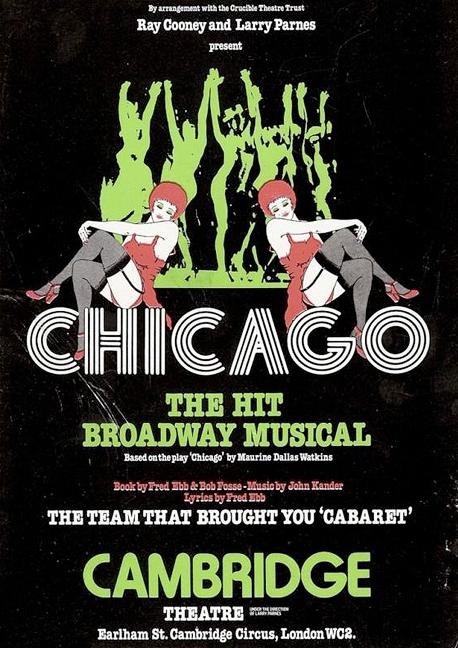
Musical
Original London
4) Chicago (Original London)
Joué durant
Nb de représentations: 600 représentations
Première preview: Inconnu
Première: 10 April 1979
Dernière: Inconnu
Compositeur: John Kander •
Parolier: Fred Ebb •
Libettiste: Fred Ebb •
Metteur en scène: Peter James •
Chorégraphe: Gillian Gregory •
Avec: Antonia Ellis (Roxie Hart), Jenny Logan (Velma Kelly), Don Fellows (Amos Hart), Hope Jackman (Momma Morton), Ben Cross (Billy Flynn), G.Lyons (Mary Sunsine)
Commentaire: Based on the 1926 play by Maurine Dallas Watkins’ and its subsequent film starring Ginger Rogers, the 1975 Broadway musical starred Gwen Verdon and Chita Rivera. Shortly after the New York opening Gwen Verdon was taken ill and temporarily replaced with Liza Minelli. The London production originated at the Crucible Theatre, Sheffield in November 1978. (plus)
Presse:
Plus d'infos sur cette production:
Plus d'infos sur ce musical
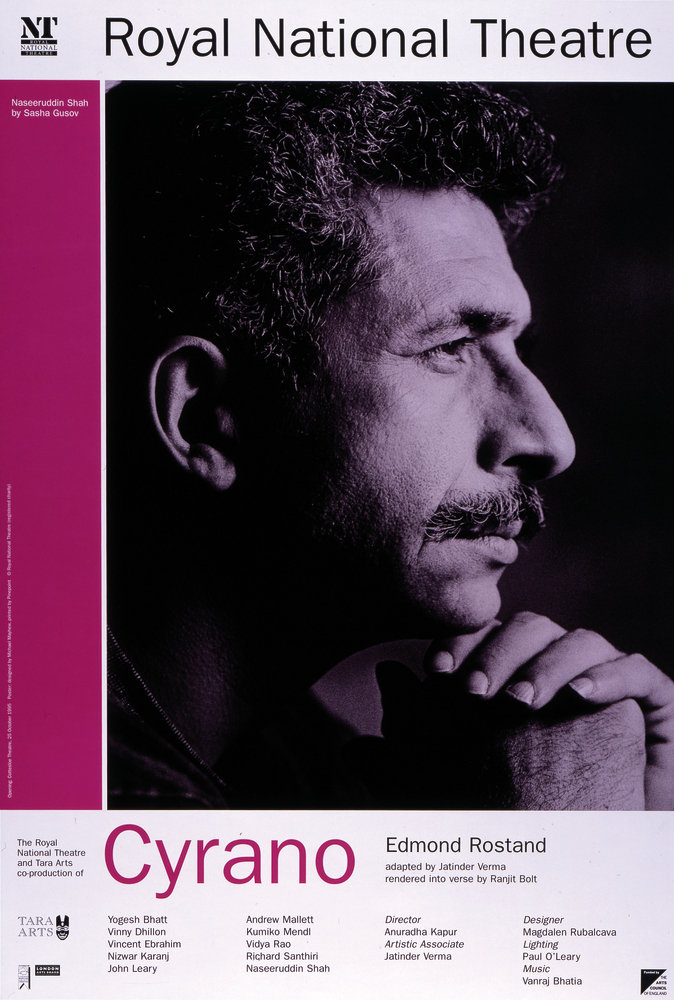
Théâtre
Revival
3) Cyrano de Bergerac (Revival)
Joué durant 2 mois
Nb de représentations: 33 représentations
Première preview: Inconnu
Première: 27 October 1970
Dernière: 31 December 1970
Compositeur:
Parolier:
Libettiste: Edmond Rostand •
Metteur en scène: Patrick Garland •
Chorégraphe:
Avec:
Commentaire: Nouvelle adaptation de Patrick Garland
Une productionj du National Theatre qui sera reprise à l'Old Vic (siège à l'époque du NT) du 10 février au 1er avril 1971 pour 10 représentations exceptionnelles. (plus)
Presse:
Plus d'infos sur cette production:
Plus d'infos sur ce musical
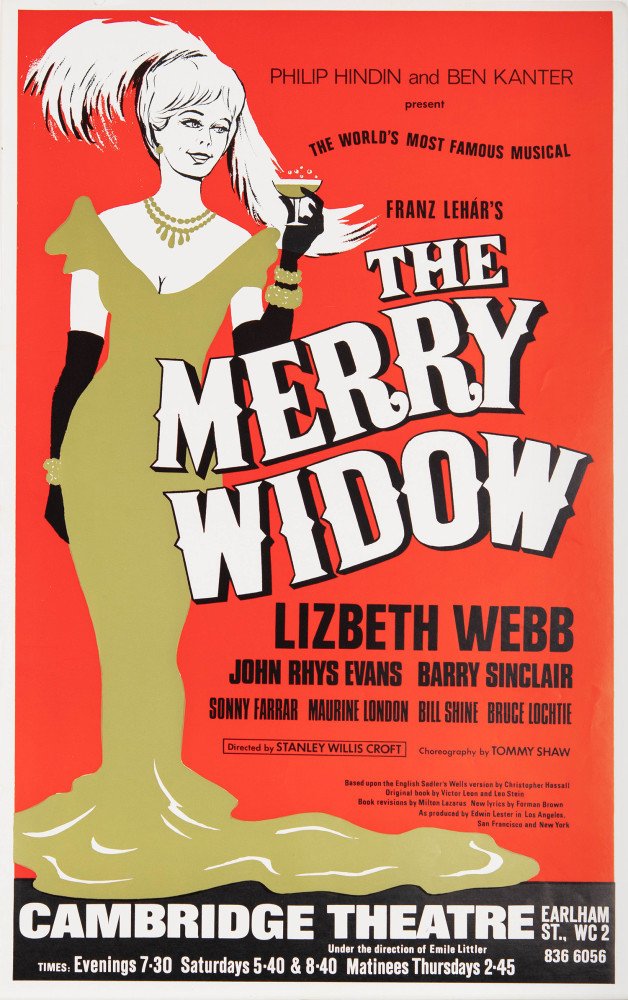
Opérette
Revival
2) Merry Widow (The) (Revival)
Joué durant 1 semaine
Première preview: 19 February 1969
Première: 19 February 1969
Dernière: March 1969
Compositeur: Franz Lehar •
Parolier: Christopher Hassall •
Libettiste:
Metteur en scène: Stanley Willis-Croft •
Chorégraphe:
Avec: Lizbeth Webb (Anna Sedoya), John Rhys Evans (Captain Danilo), Barry Sinclair (Baron Popovski), Maurine London (Baroness Popovski)
Commentaire:
Presse:
Plus d'infos sur cette production:
Plus d'infos sur ce musical
